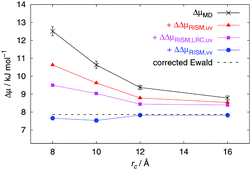Hybrid integral equation/simulation model for enhancing free energy computations
Abstract
Integral equation theory is used for extrapolating free energy data from molecular simulations of a reference state with respect to a modification of the interaction potential. The methodology is applied to the correction of artefacts arising from potential shifting and truncation. Corrective contributions for the hydration free energy with respect to the full potential are analysed for the case that both the solute–


 Please wait while we load your content...
Please wait while we load your content...